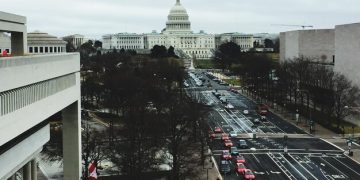State Campaign Finance Laws: Money’s Role in Elections

State campaign finance laws regulate how money is raised and spent in state elections, impacting who can contribute, how much they can donate, and how campaigns disclose financial activities, significantly influencing election outcomes.
The influence of money in politics is a perennial concern, and understanding state campaign finance laws: How is money influencing state elections? is crucial for grasping the dynamics of state-level political races.
Understanding State Campaign Finance Laws
State campaign finance laws are designed to regulate the flow of money into state-level elections. These laws vary significantly from state to state, creating a complex landscape of regulations governing who can donate, how much they can donate, and how campaigns must disclose their financial activities.
These laws play a pivotal role in shaping the competitiveness and fairness of state elections. By setting ground rules for campaign finance, they aim to prevent corruption, ensure transparency, and promote a level playing field for candidates.
Key Components of State Campaign Finance Laws
Several key components define the structure and impact of state campaign finance laws.
- Contribution Limits: These limits dictate the maximum amount of money that individuals, corporations, and political action committees (PACs) can donate to a candidate or campaign.
- Disclosure Requirements: Campaigns are required to disclose the sources and amounts of their contributions, as well as how they spend their funds. This transparency is intended to hold campaigns accountable and inform voters.
- Prohibitions on Certain Contributions: Some states prohibit certain types of contributions, such as those from foreign entities or government contractors, to prevent undue influence.
- Enforcement Mechanisms: State agencies or commissions are responsible for enforcing campaign finance laws, investigating violations, and imposing penalties.
Understanding these components is essential for evaluating the effectiveness of state campaign finance laws in regulating the flow of money and promoting fair elections.
The Impact of Money on State Elections
Money plays a significant role in state elections, influencing candidate visibility, campaign messaging, and overall electoral outcomes. The amount of money a candidate can raise and spend often determines the reach and effectiveness of their campaign.
However, the influence of money can also raise concerns about fairness and equal access to the political process. Candidates with deep pockets may have an advantage over those with limited resources, potentially skewing the results of elections.
How Money Influences Campaigns
Money can impact various aspects of a political campaign.
- Advertising: Funds are used to purchase TV, radio, and online advertising, allowing candidates to reach a broader audience and shape public opinion.
- Staffing: Campaigns require paid staff for tasks such as fundraising, communications, and field organizing.
- Polling: Money is used to conduct polls, which provide insights into voter preferences and inform campaign strategy.
- Get-Out-The-Vote Efforts: Campaigns invest in efforts to mobilize supporters and ensure they turn out to vote.
The ability to effectively allocate resources across these areas can significantly impact a candidate’s chances of success.

State-by-State Variations in Campaign Finance Laws
One distinctive aspect of campaign finance regulation in the United States is the considerable variation from state to state. These differences arise from the unique political climates, historical experiences, and policy choices of individual states.
Some states have adopted more stringent regulations to limit the influence of money in politics, while others have taken a more permissive approach. These variations can significantly impact the dynamics of state elections and the level of transparency and accountability in campaign finance.
Examples of State Approaches
Examining the approaches of a few states provides insight into the range of regulatory choices.
- California: Has relatively high contribution limits but also strong disclosure requirements.
- Montana: Features some of the lowest contribution limits in the country, reflecting a desire to curb the influence of money in politics.
- Virginia: Until recently, had some of the most permissive campaign finance laws, with no limits on individual contributions.
- New York: Has a complex system that includes public financing options designed to reduce reliance on private donations.
These examples illustrate how different states have prioritized different values and objectives in their campaign finance laws.
The Role of Political Action Committees (PACs)
Political Action Committees (PACs) are a significant force in state campaign finance. These organizations raise and spend money to support or oppose candidates and ballot initiatives. PACs can represent a variety of interests, including corporations, labor unions, and ideological groups.
While PACs are subject to certain regulations, they often have greater flexibility in their fundraising and spending activities compared to individual donors.
PAC Influence and Regulations
PACs can significantly influence state elections through various mechanisms.
- Independent Expenditures: PACs can spend unlimited amounts of money on independent expenditures, such as advertising, as long as they do not coordinate directly with a candidate or campaign.
- Direct Contributions: PACs can make direct contributions to candidates, subject to state contribution limits.
- Bundling: Some PACs engage in bundling, collecting contributions from multiple individuals and presenting them to a candidate.
Some states have sought to regulate PAC activity through measures such as contribution limits, disclosure requirements, and restrictions on certain types of PAC expenditures.

Challenges and Controversies in Campaign Finance Law
Campaign finance law is a constantly evolving area, fraught with challenges and controversies. Court decisions, legislative amendments, and shifting political dynamics all contribute to the ongoing debate over how to regulate money in politics.
Several key issues remain at the forefront of this debate, including the role of Super PACs, the impact of dark money, and the effectiveness of disclosure requirements.
Ongoing Debates
Several ongoing debates continue to shape the landscape of campaign finance law.
- Super PACs: These organizations can raise and spend unlimited amounts of money to support or oppose candidates, as long as they do not coordinate directly with a campaign. Their influence has raised concerns about the potential for wealthy donors to exert undue influence.
- Dark Money: Refers to political spending by nonprofit organizations that are not required to disclose their donors. This lack of transparency makes it difficult to track the sources of money influencing elections.
- Disclosure Requirements: The effectiveness of disclosure laws in holding campaigns accountable is a subject of ongoing debate. Some argue that stronger disclosure requirements are needed, while others contend that existing laws are sufficient.
These debates reflect fundamental disagreements about the appropriate balance between free speech rights and the need to regulate money in politics.
The Future of State Campaign Finance Regulation
The future of state campaign finance regulation is uncertain, but several trends and potential developments could shape the landscape in the years to come. These include the rise of small-dollar donations, the increasing use of online platforms for political fundraising, and the potential for further court challenges to existing regulations.
As technology and political dynamics continue to evolve, states will need to adapt their campaign finance laws to address new challenges and ensure fair and transparent elections.
Potential Developments
Several potential developments could influence the future of state campaign finance regulation.
- Small-Dollar Donations: The rise of online fundraising platforms has made it easier for candidates to raise money from a large number of small-dollar donors. This trend could reduce reliance on wealthy donors and PACs.
- Online Fundraising: The increasing use of online platforms for political fundraising raises questions about how to regulate and disclose online contributions.
- Court Challenges: Existing campaign finance laws are frequently challenged in court on First Amendment grounds. Future court decisions could significantly alter the regulatory landscape.
The ongoing evolution of technology and political dynamics will require states to remain vigilant in their efforts to regulate money in politics.
| Key Point | Brief Description |
|---|---|
| 💰 Contribution Limits | Restrictions on how much individuals/orgs can donate. |
| 📜 Disclosure | Campaigns must reveal where money comes from and how it’s spent. |
| 🚫 Prohibitions | Bans on contributions from certain sources (e.g., foreign entities). |
| ⚖️ Enforcement | State agencies oversee and penalize violations. |
Frequently Asked Questions
▼
These laws aim to ensure transparency, prevent corruption, and promote fairness in state elections by regulating the flow of money. They help level the playing field so candidates are judged on merits, not financial advantage.
▼
Contribution limits restrict the amount of money individuals and organizations can donate, which can reduce the influence of large donors and encourage broader fundraising efforts, although debates remain.
▼
PACs raise and spend money to support or oppose candidates and ballot initiatives, representing various interests and significantly impacting state elections through independent expenditures and direct contributions.
▼
Challenges include dark money (undisclosed sources), Super PACs with unlimited spending, and court challenges based on free speech rights, making regulation complex and contentious.
▼
Most states have a campaign finance agency or commission with websites providing data on contributions and expenditures. Look up your state’s election authority and search for “campaign finance disclosure”.
Conclusion
Understanding **state campaign finance laws** is essential for anyone seeking to grasp the dynamics of state-level elections and the role that money plays in shaping political outcomes. These laws vary considerably from state to state, creating a complex and ever-evolving regulatory landscape.





